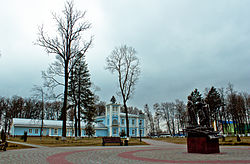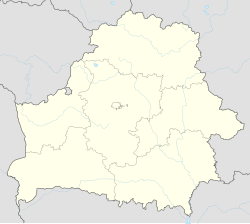Khoyniki
This article needs additional citations for verification. (January 2021) |
Khoiniki
Хойнікі | |
|---|---|
 | |
 Flag  Coat of arms | |
 Khoiniki | |
| Coordinates: 51°53′21″N 29°57′52″E / 51.88917°N 29.96444°E | |
| Country | |
| Region | Gomel Region |
| Area | |
| • Total | 20.5 km2 (7.9 sq mi) |
| Population (2005) | |
| • Total | 13,900 |
| Time zone | UTC+2 (EET) |
| • Summer (DST) | UTC+3 (EEST) |
| Postal code | 247600, 247601, 247618, 247622-247624 |
| Area code(s) | +375 2346 |
| License plate | 3 |
Khoiniki (Belarusian: Хойнікі, [ˈxɔɪ̯n̪ʲikʲi], Russian: Хойники, Polish: Chojniki) is a town in Gomel Region, Belarus. In 1986, the area around Khoiniki experienced heavy radioactive fallout from the Chernobyl accident; however, the city itself was not significantly affected. Today, the town hosts the headquarters of Polesie State Radioecological Reserve and employs over 700 people. The reserve itself is located south of the town in a heavily contaminated area.
History[]
According to historical records, Khoyniki was first mentioned in 1504 as a dependency in the Grand Duchy of Lithuania.[1] It was incorporated into the Russian Empire in 1793 , on the occasion of the Second Partition of Poland.
In 1897, the city, located in the Zone of Mandatory Residence of Jewish Subjects of the Russian Empire, had a strong community of 1,668 people (62% of the total population).[2]
In 1919, Khoïniki was attached to the Russian Soviet Federative Socialist Republic, then transferred in 1927 to the Belarusian Soviet Socialist Republic. Khoïniki was occupied by Nazi Germany from August 25, 1941 at November 23, 1943. City status was granted to it on November 10, 1967. It was seriously affected in 1986 by the Chernobyl disaster.
References[]
- ^ Аrchiwum Główny Akt Dawnych. Аrchiwum Рrozorów і Jelskich. Sygn. 1. S. 3, 200. Sygn. 2. S. 78
- ^ Jewish population of the city
- Towns in Belarus
- Populated places in Gomel Region
- Populated places established in 1512
- Kiev Voivodeship
- Rechitsky Uyezd
- Khoiniki District
- Belarus geography stubs

